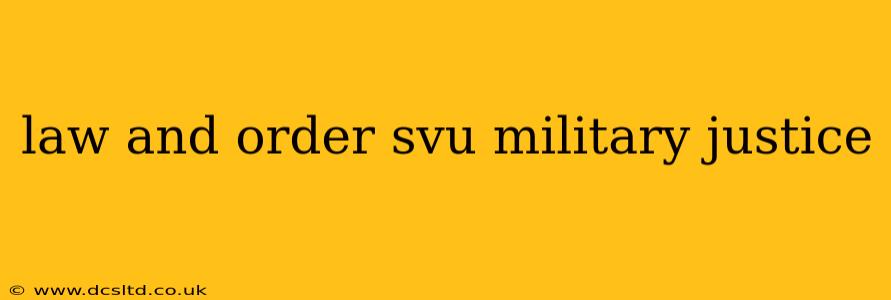Military justice is a unique legal system, separate from civilian courts, designed to maintain discipline and order within the armed forces. Its complexities are often explored in fictional narratives, and Law and Order: Special Victims Unit (SVU) has tackled these complexities on several occasions, highlighting the challenges faced when military personnel are involved in alleged crimes, particularly those of a sexual nature. This exploration delves into the intersection of military justice and civilian law enforcement, examining the jurisdictional issues and the often-fraught process of bringing perpetrators to justice.
How Does Military Justice Differ from Civilian Courts?
Military justice operates under the Uniform Code of Military Justice (UCMJ), a federal law that governs the conduct of all members of the U.S. armed forces. Unlike civilian courts, the UCMJ establishes a system of courts-martial, where military judges and juries hear cases involving military personnel. The process often emphasizes maintaining unit cohesion and military discipline, which can sometimes differ significantly from civilian legal priorities. Sentencing can also vary, with punishments ranging from administrative actions to confinement and dishonorable discharges.
What are the jurisdictional challenges when military personnel are involved in alleged crimes?
Jurisdictional issues frequently arise when military personnel are accused of crimes. The crucial question is: which court – military or civilian – has the authority to prosecute? This depends largely on several factors, including where the crime occurred (on or off base), the status of the victim (military or civilian), and the nature of the offense. If the crime occurs on a military base or involves a military member acting in their official capacity, military jurisdiction is more likely. However, if the crime occurs off base and involves a civilian victim, civilian courts usually have primary jurisdiction. The complexities are often further compounded by overlapping jurisdictions and the potential for concurrent prosecution in both systems.
Does the Military Have its own system of investigating sexual assault claims?
Yes, the military maintains its own investigative system for sexual assault claims, often involving specialized investigators from the Criminal Investigation Division (CID). These investigations adhere to the UCMJ and military regulations, potentially differing in procedures and protocols from civilian investigations conducted by law enforcement agencies. Concerns regarding the effectiveness and impartiality of military investigations and prosecutions of sexual assault cases have been raised in recent years.
How are cases involving military personnel and sexual assault handled in the context of Law and Order: SVU?
SVU frequently portrays the tension between military and civilian authorities in cases involving sexual assault. The show often illustrates the challenges faced by civilian investigators when working with military counterparts, highlighting potential jurisdictional conflicts, differing investigative approaches, and the complexities of gaining cooperation from military personnel. This highlights the need for interagency collaboration and the complexities of navigating bureaucratic hurdles to ensure accountability.
What are the advantages and disadvantages of trying a case in military court versus civilian court?
Military Court Advantages:
- Faster processing of cases, particularly those involving military personnel.
- Specialized knowledge of military culture, regulations, and customs.
- Potential for maintaining discipline and order within the military.
Military Court Disadvantages:
- Concerns regarding impartiality and the potential for bias favoring the military.
- Limited access to civilian legal resources and expertise.
- Potential for lighter sentences compared to civilian courts.
Civilian Court Advantages:
- Greater protection of due process rights.
- Access to a wider range of legal resources and expertise.
- Potential for harsher sentences.
Civilian Court Disadvantages:
- Slower processing times.
- Lack of familiarity with military culture and regulations.
The choice between military and civilian court can significantly impact the outcome of a case, underscoring the complexities and challenges of ensuring justice when military personnel are involved in criminal allegations. The decision is influenced by numerous factors and often involves delicate negotiations between civilian and military authorities. Law and Order: SVU effectively dramatizes these complexities, revealing the intricacies of this often overlooked area of law.
